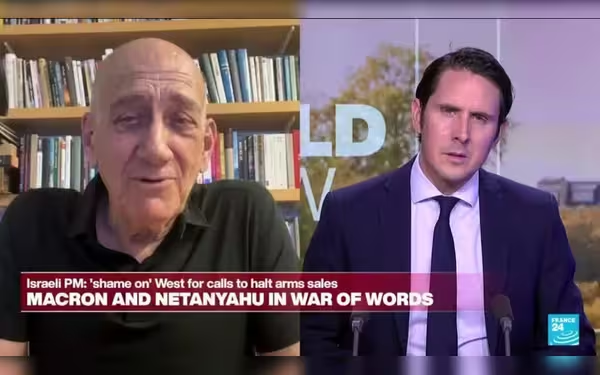Saturday, November 16, 2024 05:42 PM
Ehud Olmert Criticizes Weapons Embargo Suggestion on Israel
- Olmert calls weapons embargo suggestion a mistake.
- He criticizes Netanyahu's rhetoric amid ongoing conflict.
- The situation highlights Israel's defense challenges.
 Image Credits: france24
Image Credits: france24Ehud Olmert criticizes the suggestion of a weapons embargo on Israel, highlighting ongoing threats and political tensions.
In recent discussions surrounding the ongoing conflict in the Middle East, former Israeli Prime Minister Ehud Olmert has made a significant statement regarding the suggestion of a weapons embargo on Israel. This comes at a time when tensions are high, with Israel facing numerous threats, including ballistic missiles and rocket attacks from groups such as Hezbollah and Hamas. Olmert's comments shed light on the complexities of the situation and the challenges faced by Israel in its defense.
Olmert stated, "It was a mistake to suggest an embargo of weapons on the state of Israel at a time when 200 ballistic missiles are shot at us, hundreds of rockets are shot at us from Lebanon by Hezbollah and Hamas continues its war and we need to somehow fight it through." His remarks highlight the precarious position Israel finds itself in, as it navigates both external threats and internal political dynamics.
Furthermore, Olmert expressed his discontent with the current rhetoric employed by Prime Minister Binyamin Netanyahu, stating, "I don't like the rhetoric of Binyamin Netanyahu. It is well known: I am not his supporter, to put it mildly." This statement indicates a growing divide within Israeli politics, as former leaders voice their concerns over the current administration's approach to handling the ongoing conflict.
The situation in the Middle East is not just a political issue; it is a humanitarian one as well. The ongoing violence affects countless lives, and the call for an embargo raises questions about the balance between supporting a nation’s right to defend itself and the broader implications for peace in the region. As discussions continue, it is crucial for all parties involved to consider the long-term consequences of their actions and rhetoric.
Olmert's comments serve as a reminder of the complexities surrounding the Israeli-Palestinian conflict and the need for thoughtful dialogue. As the situation evolves, it is essential for leaders to prioritize peace and stability, ensuring that the voices of those affected by the conflict are heard and considered. The path forward may be fraught with challenges, but it is through understanding and cooperation that a lasting resolution can be achieved.













